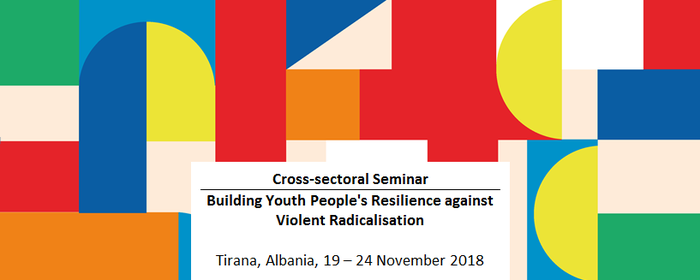Seminar: Building young people's resilience against violent radicalisation, Tirana, 19 - 24 Nov 2018
Young people's personal circumstances and the wider political, social and economic environment in which they live may make them vulnerable to various radical influences and also violent radicalisation. Realities of this emerging trend make it necessary to emphasise the need to work with young people in Europe and its neighbouring regions, in order to strengthen their resilience to violent radicalisation, and reinforce the openness and inclusiveness of the communities in which they live.
The seminar "Building Young People's Resilience against violent Radicalisation" was held in Tirana, Albania, from 19 - 24 November 2018. It was part of the strategy on the topic of ‘Youth work against violent radicalisation’, which has been developed by a consortium of several National Agencies for Erasmus+, youth field, four SALTO Resource Centres and the EU-Council of Europe Youth Partnership since 2016. Building young people's resilience is work that youth workers have always done. The focus is to strengthen this role of youth work in the context of increasing religious and political radicalism in today’s societies in Europe and its neighbouring regions.
Within this context, THIS SEMINAR offered a space for:
- Sharing practices of youth workers and all kinds of different actors in building community resilience against the violent radicalisation of young people;
- Reflecting about the role of different actors in the prevention of young people’s radicalisation leading to violence;
- Analysing the transferability of existing practices and tools to other contexts;
- Raising the visibility of the role that non-formal education can play in building community resilience; and
- Exploring possible interdependencies between different approaches and how to implement effective strategies.
A cross-sectoral approach is important in order to recognise all the actors that are actively involved in the process of building community resilience. This approach offers the possibility to create links with others, to be visible and to be aware of other experiences, potential interdependencies and synergies.
32 practitioners from different professional contexts (such as youth work, social work, formal education, the public sector etc), all with experience in working in directly with young people on building community resilience and/or working to prevent young people's radicalisation took part in the seminar. The participants came from a variety of Erasmus+ Programme countries and the three Neighbouring Partner Regions.
More information, blogs, interviews with participants and resources are available on the project website http://youthcommunityresilience.eu/
